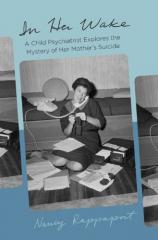Reading Group Guide
Discussion Questions
In Her Wake: A Child Psychiatrist Explores the Mystery of Her Mother

1. Is it possible to escape the past, or do you think that your history always finds a way to influence the present?
2. Some readers see In Her Wake as a love story. Do you agree? If so, how is this portrayed? Do you agree?
3. Nancy’s mother wrote a novel called The End of Freedom (see Chapter 3, pp. 21-33.. What kind of parallels do you think might exist between the novel’s main character and what was going on in Nancy’s mother’s life as she was writing the novel?
4. How is psychological suspense created in the book, even though the conclusion of the story is known?
5. *What do the quotes Nancy chose to appear at the beginnings of many chapters mean to you? (For example, in Chapter 5, she highlights the following: “Your absence has gone through me…” and in Chapter 2she includes: “No one ever told me that grief felt so like fear.”.
6. What is the role of forgiveness in this memoir?
7. To write this book, Nancy not only examined her own inner experience but also drew from other sources for information about the facts surrounding her mother’s life and death. Are there parts of your own history that you might want to explore to see how your inner reality might relate to external “factual” reality?
On therapy:
8. When Nancy saw a therapist as a teenager (see p. 221., or as an adult and a mother (see page 72), how did she examine her own beliefs about her loss, and how did this help her?
9. Some people turn to a therapist to help them understand a painful experience, while others seek out people who may have been involved in similar experiences or even “go it alone.” If you are trying to sort something out, what works best for you?
10. Nancy explores different theories about affairs and how they shape the way a therapist approaches work with their patients (see pp. 93-95). How do you feel an affair jeopardizes a marriage and what are some potential ways to repair the marriage after an affair?
11. How did you respond when Nancy took care of the psychotic young teenager who was losing control of his mind (see p. 247)?
On family:
12. In Chapter 5 (pp. 58-67), Nancy realizes that when she was growing up there was an unwritten rule in her family that none of her siblings would talk about their mother or her suicide. What are some of the unspoken rules in your family? Does Nancy’s story make you curious to ask your siblings or other relatives questions about something significant that has occurred in your family (such as divorce, loss of a family member)?
13. Some people believe that it’s best to leave family secrets hidden and to leave family trauma in the past; others will say that it’s best to voice them and find ways to explore them openly with a friend or therapist. Nancy chose to uncover her history. What do you think are the benefits and costs of each choice?
14. What does Nancy’s father mean when he says to Nancy: “Never allow the child to define the relationship” (p. 277)? How does Nancy’s relationship with her father evolve? (see pp. 229-230 and pp. 273-282).
15. During In Her Wake, does Nancy change how she thinks about her mother?
16. As you have matured, has your understanding of your childhood shifted? In what ways?
In Her Wake: A Child Psychiatrist Explores the Mystery of Her Mother
- Publication Date: September 1, 2009
- Paperback: 320 pages
- Publisher: Basic Books
- ISBN-10: 046501450X
- ISBN-13: 9780465014507







